Supporting New and Expectant Parents
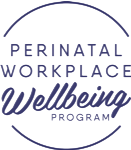 The Perinatal Workplace Wellbeing Program (PWWP) was an initiative designed to address the needs of expectant and new parents in the workplace. Developed by the Centre of Perinatal Excellence (COPE) and Transitioning Well, the aim of PWWP was to improve the mental health and wellbeing of employees during this critical life stage.
The Perinatal Workplace Wellbeing Program (PWWP) was an initiative designed to address the needs of expectant and new parents in the workplace. Developed by the Centre of Perinatal Excellence (COPE) and Transitioning Well, the aim of PWWP was to improve the mental health and wellbeing of employees during this critical life stage.
The program focused on providing education, resources, and support to both employees and employers. By fostering a supportive workplace culture and equipping individuals with the necessary tools and knowledge, the PWWP sought to mitigate the challenges associated with the perinatal period and promote positive outcomes for both parents and organisations.

Project snapshot
- Developed the Perinatal Workplace Wellbeing Program (PWWP) through collaboration between Centre of Perinatal Excellence (COPE) and Transitioning Well, funded by WorkSafe's WorkWell Mental Health Improvement Fund to support expectant and new parents in Victorian workplaces
- Implemented a comprehensive four-component approach including HR policy capacity building, leader training, employee resources, and the iCOPE-W platform to create a supportive ecosystem for working parents
- Successfully partnered with Wesfarmers (Kmart, Target and Bunnings (see more below)), Probuild and Multiplex to demonstrate program effectiveness, resulting in reduced absenteeism, improved employee satisfaction, and enhanced retention rates among new and expectant parents
- Paved the way for cultural transformation such as executive sponsorship, flexible work arrangements, on-site parent facilities, and structured return-to-work programs
- Created lasting impact through establishing employee resource groups, mental health first aid training, and manager education, leading to measurable improvements in workplace support for the transition from 'working person' to 'working parent'
HOW THE PERINATAL WORKPLACE WELLBEING PROGRAM MADE A DIFFERENCE
Program Design
The development of the PWWP commenced with a comprehensive needs assessment to identify the specific challenges faced by expectant and new parents in the workplace. This process involved a thorough review of existing literature on perinatal mental health, workplace wellbeing, and organisational support systems.
To gain a deeper understanding of the experiences and perspectives of employees, focus groups were conducted with expectant and new parents from both the construction and retail industries. These discussions provided invaluable insights into the challenges they encountered, the support they required, and the types of resources that would be most beneficial. Additionally, focus groups with HR professionals and organisational leaders were held to explore their perspectives on supporting employees during the perinatal period and to identify potential barriers and facilitators to program implementation.
The findings from these research activities informed the development of the PWWP's core components and delivery strategies. By closely aligning the program with the identified needs of employees and organisations, the PWWP aimed to maximise its impact and relevance.
Program Components
The PWWP was designed to provide a comprehensive and multi-faceted approach to supporting expectant and new parents. The program consisted of four key components as outline below. By combining these components, the PWWP aimed to create a comprehensive and supportive ecosystem for expectant and new parents and their leaders.

A note on the role of workplaces
Given the unique challenges faced by expectant and new parents, the workplace environment plays a crucial role in supporting their overall wellbeing. Employers have a responsibility to create supportive and inclusive workplaces that accommodate the needs of their employees during this life stage.
A growing body of research highlights the economic implications of inadequate support for new parents. Maternal mental health issues can lead to increased absenteeism, presenteeism (reduced productivity while at work), and turnover. Moreover, organisations with a reputation for being family-friendly are more likely to attract and retain top talent.
By investing in programs and policies that support the mental health and wellbeing of expectant and new parents, employers can create a positive work culture, enhance employee morale, and improve overall organisational performance.
“Becoming a parent is one of the most significant transitions a person will go through in their lifetime. Many adjustments have to be made to successfully navigate the transition to parenthood, including the fundamental transition from ‘working person’ to ‘working parent'.”
Perinatal resources designed to support and make a difference to the mental health and wellbeing of expectant and new parents in workplaces.
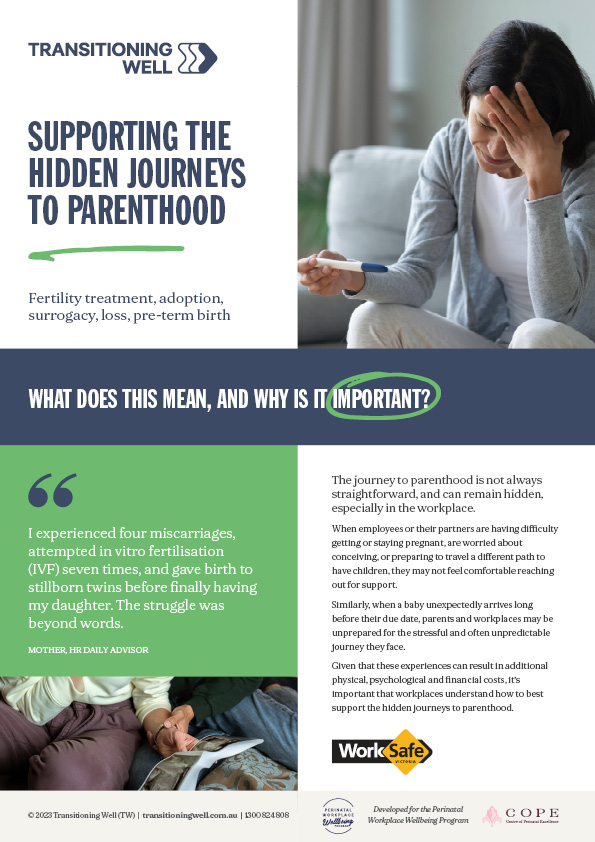
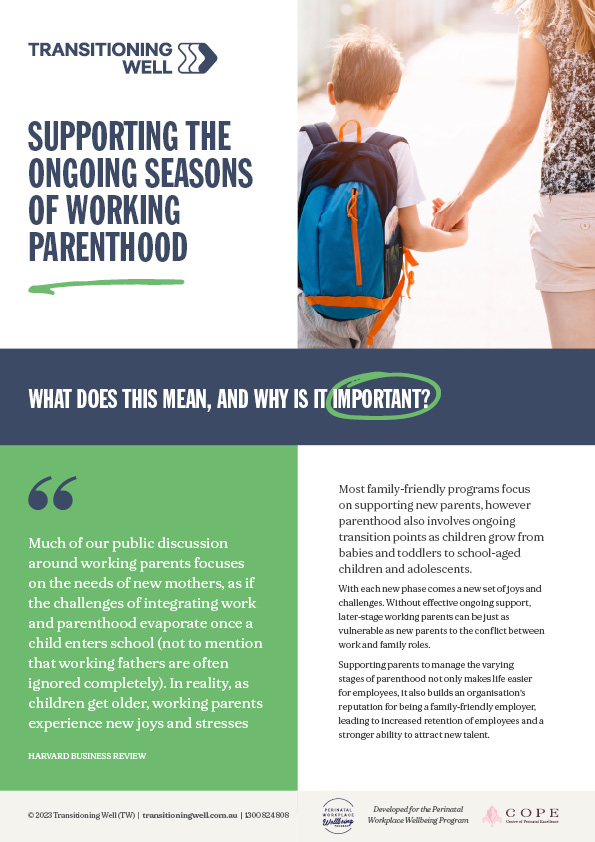
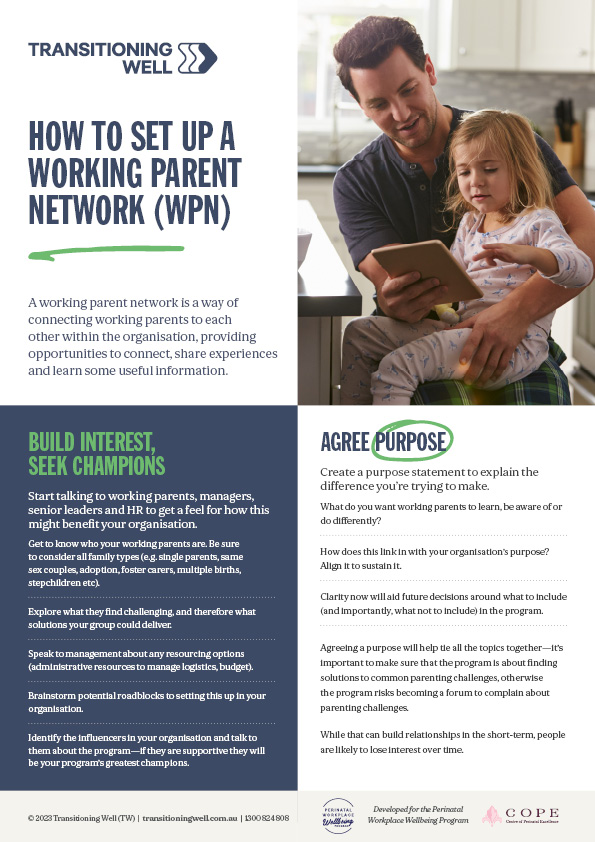
“We've had amazing, overwhelming feedback about how positive the program is. People are indicating how important it has been to give them information and insight and the benefits are really widespread right through the organisation from the top to the bottom.”
Case Study in Action: Bunnings
In 2019, Bunnings participated in the Perinatal Workplace Wellbeing Program (PWWP) to provide additional support to expectant and new parents in the workplace. As part of Bunnings’ commitment to wellbeing and recognising the unique challenges faced by parents, the program offered resources for parents, along with improvements to policy and practices.
Following the conclusion of the PWWP study in 2021, Bunnings has continued to offer the program to its team members as part of its ongoing support for parents in the workplace.
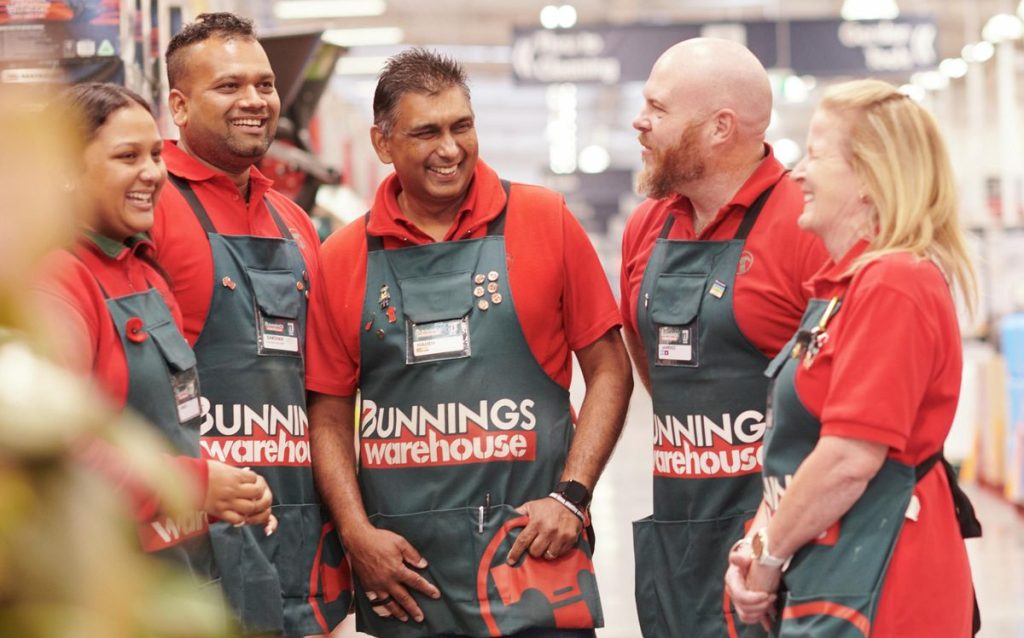
Leadership Commitment and Co-Design Approach
Bunnings played a key role in co-designing the program, with seven team members participating in focus groups to tailor it to the business's needs—an effort that was instrumental in driving the implementation of the PWWP.
- Survey Participation: 329 Bunnings team members responded to the workplace survey, providing valuable insights into support for expectant and new parents.
- Workshop Attendance: 39 Bunnings team members attended workshops delivered by specialists from Transitioning Well, HR Legal and COPE.
Education and Training
Bunnings focused on education through a range of resources and training:
Manager training: Leaders received training on supporting team members during pregnancy, parental leave, and return to work. After training, leaders showed increased understanding in several key areas:
- 52% increase in the familiarity of available resources
- 46% increase in knowledge of legal obligations regarding supporting working parents
- 43% increase in awareness of best practice strategies
- 39% increase in understanding risks associated with the perinatal period
- 39% increase in understanding the unique nature of perinatal mental health
Team member resources: Team members were provided with resources across three stages of parental leave (preparing for leave, during leave, and returning to work). After completing the modules, team members reported feeling more confident and more aware of available resources.
Online resources: Bunnings team members were given access to self-assessment tools through iCOPE-W to monitor their own mental health and wellbeing on topics such as burnout, work-family conflict, support at work, job demands, along with referral pathways to support services.

Comprehensive Support
As a result of participation in the program, Bunnings has been able to improve its support systems for expectant and new parents, including through:
- Flexible work arrangements: Survey data showed that 87% of those with formal flexible work arrangements in place were satisfied with their arrangement, with the survey identifying opportunities for more consistent implementation.
- Parental leave policies: Bunnings updated their parental leave policy during the program period, with key changes related to Keep In Touch days.
- On-site amenities: Bunnings updated their breastfeeding guidelines and introduced visual signage of breastfeeding-friendly locations throughout stores for both staff and customers. Bunnings has also introduced dedicated parenting rooms at their support office locations.
Bunnings participation in the PWWP demonstrates its commitment to team member wellbeing and their recognition of the unique challenges faced during the transition to parenthood. We deeply appreciate and thank Bunnings for its valuable contribution to this project.
Support that makes a difference
Funded by WorkSafe's WorkWell Mental Health Improvement Fund, the Perinatal Workplace Wellbeing Program (PWWP) was designed to support and make a difference to the mental health and wellbeing of expectant and new parents in Victorian workplaces.
The aim of the program was to create organisational change to provide a working environment that impacts positively on the mental health and wellbeing of new and expectant parents.
Resources from the Australian Perinatal Perinatal Workplace Wellbeing Program have now been migrated to our new site to support new and expectant parents, and their employers, the Parent Well.
The PWWP was funded by WorkSafe's WorkWell Mental Health Improvement Fund.

The Perinatal Workplace Wellbeing Program (PWWP) was a collaboration between Transitioning Well and Centre of Perinatal Excellence (COPE).
